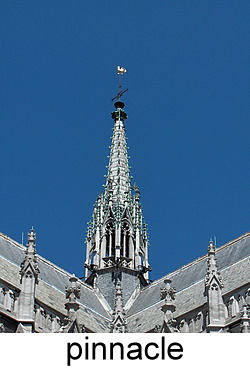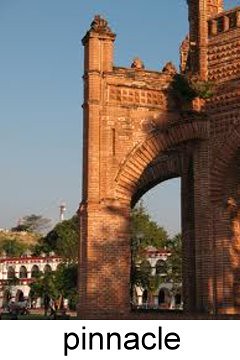

pinnacle
n. [an upright architectural member generally ending in a small spire and used especially in Gothic construction to give weight especially to a buttress ]
n. [the highest point of development or achievement ]
ex. the pinnacle of one's career
from wiki:
The pinnacle had two purposes:
Ornamental - adding to the loftiness of the structure. They sometimes ended with statues, such as in Milan Cathedral.
Structural - the pinnacles were very heavy and often rectified with lead, in order to enable the flying buttresses to contain the stress of the structure vaults and roof. This was done by adding compressive stress (a result of the pinnacle weight) to the thrust vector and thus shifting it downwards rather than sideway.
字源(看看就好):1300–50; Middle English pinacle < Middle French < Late Latin pinnāculum gable, equivalent to Latin pinn ( a ) raised part of a parapet, literally, wing, feather ( see pinna) + -āculum; see tabernacle
pinpoint
v. [to locate or identify exactly ]
ex. to pinpoint a place on a map
ex. to pinpoint a problem
n. [an insignificant or trifling thing]
n. [the point of a pin]
pious (ˈpaɪəs)
adj. [having or showing a dutiful spirit of reverence for god or an earnest wish to fulfill religious obligations.]
adj. [characterized by a hypocritical concern with virtue or religious devotion; sanctimonious. ]
ex. He thinks his critics as pious do-gooders who were afraid to face the facts. 他把批評他的人斥之為不敢面對事實的假善人.
字源:from L. purus "pure, clean"
ps. piety (=piousness) 字源上是pi ous +ety( itās )
ps. allegiance, faith, loyalty, obedience, reverence, sanctity, veneration,
pique (piːk)
n. [a feeling of resentment or irritation, as from having one's pride wounded]
v. [to cause to feel resentment or irritation]
字源:1532, "fit of ill feeling," from M.Fr. pique "a prick, sting, irritation,". The verb, in the sense of "to excite to anger" is attested from 1671.
ps. pique也可以指a weaving style:ex. gelato pique ( link )
piquant (ˈpiːkəntt)
piqu e -ant
adj. [ agreeably pungent or sharp in taste or flavor]
ex. Bland vegetables are often served with a piquant sauce .
清淡的蔬菜常以辛辣調味.
ex. 甜辣醬
ps. review p.193的 pungent [pung-ent] adj.(氣味等)有刺激性的
pirate (ˈpaɪr ə t)
n. [a person who robs or commits illegal violence at sea or on the shores of the sea. piracy]
v. [to use or reproduce (a book, an invention, etc.) without authorization or legal right]
One piece, 神鬼奇航...
real pirate: Somalia Pirate interview
pirouette
n/v. [a whirling about on one foot or on the points of the toes, as in ballet dancing.]
Ballet的一種termiology (from Franch)
ps. Ballet is a formalized kind of performance dance, which originated in the Italian Renaissance courts of the 15th century, and which was further developed in France, England, and Russia as a concert dance form.
Learn How to Pirouette
題外:
Swan Lake (Russian: Лебединое озеро, Lebedinoye ozero) is a ballet, op. 20, by Pyotr Tchaikovsky, composed 1875–1876. The scenario, initially in four acts, was fashioned from Russian folk tales.[1] It tells the story of Odette, a princess turned into a swan by an evil sorcerer's curse.
Margot Fonteyn as Odette in "Swan Lake" Act II Pt. 1
pistol
n. [a handgun whose chamber is integral with the barrel broadly ]
ps. holster (p.128)
字源:from wiki:There are two possible origins of the name pistol. According to the first one, the word pistol is derived from Czech. The hussite warriors introduced guns called píšťala in the 1420s . Germans called them pitschale, pitschole, petsole and so on. Later German raiders brought the guns as well as the name to France, were they were known by terms pistole and pistolet.[2] According to alternative source, the word "pistol" is derived from the French word pistole or pistolet, which have originated from the city of Pistoia, Italy where hand-held guns (designed to be fired from horseback) were first produced in the 1540s
pitch
v. [to hurl or throw (something); cast; fling]
v. [to aim or fix (something) at a particular level, position, style, etc]
ex.if you advertise privately you may pitch the price too low
ps. 當名詞時;(from wiki) Pitch is an auditory perceptual property that allows the ordering of sounds on a frequency-related scale. Pitches are compared as "higher" and "lower" in the sense associated with musical melodies, which are coherent successions of pitches. Pitch is a major auditory attribute of musical tones, along with duration , loudness , and timbre .
Basic Essentials of Music Theory : Pitch & The Quarter Note: Basic Essentials of Music Theory
Pitch is an auditory sensation in which a listener assigns musical tones to relative positions on a musical scale based primarily on the frequency of vibration. Pitch is closely related to frequency, but the two are not equivalent. Frequency is an objective, scientific concept, whereas pitch is subjective. Sound waves themselves do not have pitch, and their oscillations can be measured to obtain a frequency. It takes a human brain to map the internal quality of pitch.
n. [ coal-tar pitch, any of various heavy dark viscid substances obtained as a residue from the distillation of tars]
pitcher
n. [a container, usually with a handle and spout or lip, for holding and pouring liquids.]
字源:"earthen jug," late 13c., from O.Fr. pichier (12c.), altered from bichier
ps. review p.280的jar
pitfall
pit( a hole, shaft, or cavity in the ground )-fall
n. [a trap in the form of a concealed pit, designed to catch men or wild animals]
n. [an unsuspected difficulty or danger]
ex. The pitfalls of working abroad are numerous.
pith
n. from wiki : Pith - also called medulla - is a substance that is found in vascular plants. The two main functions of pith are nutrient storage and the transport of nutrients through the stem, branches, leaves, and roots of the plant. Pith is made up of soft, spongy parenchyma cells, and is located in the center of the stem in eudicots (both herbaceous and woody) and in the center of the roots in monocots.
n. [the essential or important part, point, etc]
<>superficial element
pithy
pith-y
adj. [terse and full of meaning or substance]
<>prolix
pithiness
pith y -ness
n. 名詞化的pithy